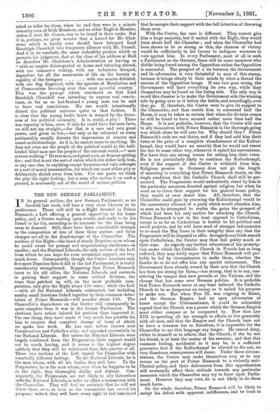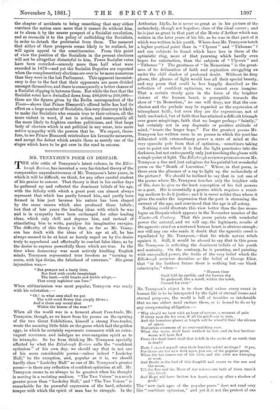THE NEW GERMAN PARLIAMENT.
IN its general outline, the new German Parliament, as we foretold last week, will bear a very close likeness to its predecessor. There will still be a Right devoted to Prince Bismarck, a Left offering a general opposition to his home policy, and a Centre waiting upon events, and ready to be his friend or his foe, according as its interests for the time being seem to demand. Still, there hare been considerable changes in the composition of two of these three parties, and these changes are all to the disadvantage of the Chancellor. The nucleus of the Right—the band of sturdy Deputies upon whom he could count for prompt and unquestioning obedience—is smaller ; and the National Liberals, the only section of the Left from which he can hope for even occasional support, are very much fewer. Consequently, though the Centre numbers only five more Deputies than it did in the last Parliament, it is really considerably strengthened. Supposing that Prince Bismarck turns to his old allies, the National Liberals, and succeeds in gaining their support in some critical division, the truce thus patched up will, on the most probable com- putation, only give the Right about 130 votes : while the Left —with all the National Liberals subtracted, but including sundry small fractions linked together by their common detes- tation of Prince Bismarck—will number about 150. The Chancellor's dependence on the Centre will consequently be more complete than it was in the former Parliament. The eleetions have rather injured his position than improved it. For one thing, they have made it very much less possible for- him to execute that complete change of front of which we spoke last week. He has once before thrown over Conservatives and Catholics alike, and appealed successfully to the National Liberals. But unless the National Liberals were largely reinforced from the Progressists, their support would not be worth having, and it seems in the highest degree unlikely that they will be reinforced from this quarter at all. 'These two sections of the Left regard the Chancellor with essentially different feelings. To the National Liberals, he is -the man whom, with all his faults, they still love. To the Progressists, he is the man whom, even when he happens to be in the right, they thoroughly dislike and distrust. Con- sequently, the Progressists are not likely to ally themselves with the National Liberals, in order to effect a transaction with the Chancellor. They will feel no certainty that he will not throw them over, as soon as the transaction has served his purpose ; indeed, they will have every right to feel convinced
them over.
With the Centre, the case is different. They cannot give him a large majority, but if united with the Right, they would form about half the Chamber ; and when the Chancellor had been shown to be as strong as this, the chances of victory would be sufficiently in his favour to indispose waverers to vote against him. In every Parliament, most of all in such a Parliament as the German, there will be some members who dislike being found among the Opposition unless the Opposition is successful. The prospect of a tie between the Government and its adversaries is very distasteful to men of this stamp, because it brings clearly to their minds by what a thread the success of the Opposition hangs. If one vote goes wrong, the Government will have everything its own way, while they themselves may be found on the losing side. The only way to avoid this disaster is to make the Government side the winning side by going over to it before the battle, and accordingly, over they go. If, therefore, the Centre were to give its support to the Chancellor, and thus enable him to command half the House, it may be taken as certain that when the division comes he will be found to have secured rather more than half the House. It is not probable, however, that the Centre will care to ally themselves with Prince Bismarck in the thorough-going way which alone he will care for. Why should they? Prince
Bismarck's ends are not theirs, and if they had sold him their votes at the price of a complete abandonment of the Kultur- kampf, they would have no security that he would not renew the war in some other way, whenever it suited his convenience. Nor have they any strong reason for selling him their votes. He is not particularly likely to continue the Kulturkampf, even if the support of the Centre is withheld from him. Religious passion in Germany dces not go the length of assenting to everything that Prince Bismarck wants on the single condition that the Catholic Church shall still be per- secuted. The Progressists would undoubtedly stand by him in the particular measures directed against religion, but when he went on to claim their support for his general home policy, they would at once desert him. All, therefore, that the Chancellor could gain by renewing the Kulturkampf would be the momentary alliance of a party which would abandon him, as soon as he attempted to realise the gains the prospect of which had been his only motive for attacking the Church. Prince Bismarck is not in the least opposed to Catholicism, except in so far as Catholicism is hostile to his political and social projects, and he will have need of stronger inducements to re-enact the May Laws in their integrity than any that the Progressists will be disposed to offer. As regards any fresh assault upon Catholicism, the Centre may thus feel pretty much at their ease. As regards any further relaxations of the proscrip- tion under which the Catholic Church in Prussia has so long suffered, they may fairly argue that Prince Bismarck will pro- bably be led by circumstances to make them, whether the Centre do or do not offer him any special inducement. The Government have already owned by their acts that the Church has been too strong for them,—too strong. that is to say, con- sidering the temper that now prevails at the Vatican, and the• change that has come over German politics. It is probable that Prince Bismarck never at any time believed the Catholic Church to be as dangerous an enemy as it suited his purpose to make out. But when Pius IX. was reigning in Rome, and the German Empire had no open adversaries at home except the Ultramontanes, it cauld be colourably argued that the Church was a power which the German Empire must either conquer or be conquered by. Now that Leo XIII. is spending all his strength in efforts to live peaceably with all men, and that the Empire and the Church turn out to have a common foe in Socialism, it is impossible for the Chancellor to use this language any longer. He cannot deny, either to himself or to others, that the Church, if she be not his friend, is at least the enemy of his enemies; and that this common feeling, accidental as it may be, is a sufficient guarantee that if the Kulturkampf be allowed to die out, no very disastrous consequences will ensue. Under these circum- stances, the Centre may make themselves easy as to any return on the part of Prince Bismarck to a violently anti- Clerical policy., and their deliverance from this apprehension will necessarily affect their attitude towards any particular measures which the Chancellor may try to force upon Parlia- ment. However they may vote, he is not likely to do them much harm.
On the whole, therefore, Prince Bismarck will be likely to accept his defeat with apparent indifference, and to trust to
the chapter of accidents to bring something that may either convince the nation once more that it cannot do without him, or to alarm it by the nearer prospect of a Socialist revolution, and so reconcile it to the policy of outbidding the Socialists, in order to detach the proletariat from them. The moment that either of these prospects seems likely to be realised, he will again appeal to the constituencies. From this point of view the position of the Socialists in the present elections will not be altogether distasteful to him. Fewer Socialist votes have been recorded—scarcely more than half what were recorded in 1878—and yet the Socialist Deputies are expected when the complementary elections are over to be more numerous than they were in the last Parliament. This apparent inconsist- ency is due to the fact that their opponents are more divided amongst themselves, and there is consequently a better chance of a Socialist slipping in between them. But while the fact that the Socialist votes have dwindled down from 480,000 to 260,000— these are the figures given by the Berlin correspondent of the Times—shows that Prince Bismarck's offered bribe has had its effect on a large number of Socialists, this very discovery is likely to make the Socialists who remain true to their colours, all the more violent in word, if not in action, and consequently all the more likely to frighten careless politicians, and that large body of electors which is not political in any sense, into more active sympathy with the powers that be. We expect, there- fore, to see Prince Bismarck reintroduce his favourite measures, and accept the defeat which awaits them as merely one of the stages which have to be got over in the road to success.



































 Previous page
Previous page